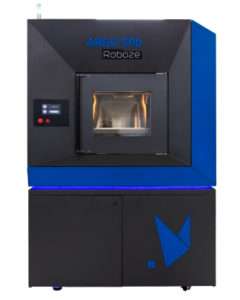University of Delaware – Center for Composite Materials chooses Roboze ARGO 500 to support US ARMY Programs
March 9th, 2020 – Bari, Italy
| Founded in 1974 within the University of Delaware’s College of Engineering, the Center for Composite Materials (CCM), is an internationally recognised interdisciplinary center of excellence, for composites research and academic education.
With the aim of expanding their research, CCM chooses Roboze ARGO 500 for its high precision and repeatability in the production of parts with super polymers and composite materials, and for its printing process that is optimised with automatic solutions that are faster than other FFF systems on the market. The University of Delaware is participating in collaborative research with the Combat Capabilities Development Center US Army Research Laboratory on Additive Manufacturing of high temperature composite FFF. Under this particular program, there are two main focus areas. The first one is on the development of a modeling and simulation tool to help accelerate acceptance of Additively fabricated components. This software tool will take material and process info from the Roboze ARGO 500 and combine that with mechanical and thermal requirements of the desired component. This tool will be used by US Army design engineers to assist them in rapid down-select of design options while providing options to optimize performance for particular use-cases. The US Army and the rest of the Department of Defense (DoD) are interested in increasing the speed of insertion of AM parts into all appropriate logistics chains. Unfortunately, certification and qualification are slow and costly processes, but the University is convinced that this tool will help the DoD partners with speeding up acceptance of AM parts by optimizing this virtual design process that incorporates information directly from the printer. |
 |
The second focus area is on part fabrication.
“While we are working to assist in mainstream acceptance of AM in DoD supply chains, there are some missions that have a less rigorous pathway to fielded use. Once such case could be unmanned or autonomous vehicles” says Larry R. Holmes, Jr., Assistant Director, Digital Design and Additive Manufacturing at UD-Center for Composite Materials.
The University of Delaware will collaborate with US Army scientists and engineers on rapid design and fabrication of components for ground and air systems. The implementation of Roboze ARGO 500 will help to perform iterative design and fabrication of mission specific parts, in order to show rapid and low cost fielding of components for these vehicles. The University will leverage both of these capabilities to expand the operational envelope of AM within the DoD.
“The Army needs to reduce logistics burdens and find ways to be adaptive to rapidly changing mission needs. Additive manufacturing can meet these needs, but must also offer parts with the durability and dependability that are demanded by Soldiers who rely on their equipment to accomplish critical missions.” says John Gerdes, Ph.D., Team Lead (A) Technology Development & Transition at Vehicle Applied Research Division, US Army Research Laboratory.
While these current collaborative efforts are important, there is a broader perspective to consider, thus the Roboze ARGO 500 will also be used as a teaching and research aid for University of Delaware faculty, staff and students.
“Roboze ARGO 500 was selected for our collaborative efforts. We are especially concerned with repeatability and accuracy, and the ARGO 500 helical rack and pinion hardware (beltless system) can help us provide these qualities. We also required the ability to print high performance materials and require a broad range of thermal profiles to do so. The ARGO 500 can print all of the materials of interest, from standard FFF materials to fiber reinforced high temperature thermoplastics. ” says Mr. Holmes.
“Finally, we want to assure stability of prints when using high temperature materials, so we need to ensure we have control of the build chamber temperature, and the ARGO promises to give us that control. The automatic build plate leveling system and vacuum system within the ARGO were also important aspects in the selection of this equipment.” concludes Mr. Holmes.
“We are very satisfied about the fact that the US Army and the University of Delaware will produce strategic components, using the technological standard offered by our Argo 500 and the performance guaranteed by Roboze super polymers.” declares Alessio Lorusso, Roboze CEO & Founder. “We are working very close with some of the biggest industrial players in America in the Defense, Aerospace, Oil & Gas and Automotive sectors that are testing Roboze 3D printing technology in their production processes. Roboze has an office in Italy and one in US, and we believe that the combination of our two cultures is successful to design the best engineering solutions for in key sectors of the American economy.”
PRESS RELEASE CONTACTS
ROBOZE SPA
Ilaria Guicciardini
+39 328 253 62 36
press@roboze.com
roboze.com
UNIVERSITY OF DELAWARE
CENTER FOR COMPOSITE MATERIALS
Corinne Hamed
+1 302-831-1675
hamed@udel.edu







